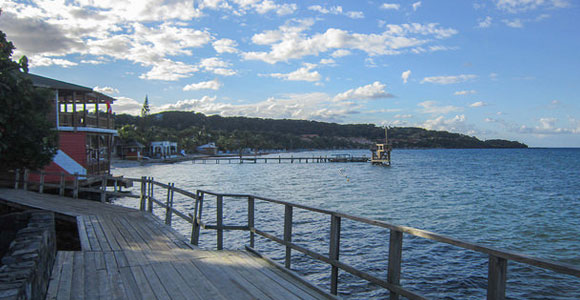Visas
If you are traveling to Honduras as a tourist, you will need a valid passport, but no visa if you are a citizen of the United States. If you’re traveling to Honduras by car, you will need to show documents for the car as well as a valid driver’s license. You will receive a 30-day circulation permit that you can extend for up to six months.
Honduras does not require any immunizations. However, U.S. public health departments normally recommend a tetanus booster (good for 10 years), Hepatitis A and B shot, and typhoid shot. For the Bay Islands, the CDC advises you take an antimalarial drug, which you would normally begin taking before you depart and continue taking for several weeks after you return home. Those who move to the islands permanently do not take anti-malarial drugs, however, and the occurrence of the disease is quite low. Being a tropical area, the CDC automatically recommends that you err on the side of caution for travel. Call your local public health department for details.
Getting Your Retirement Residency Card
Before heading off to seek your retirement paradise in Honduras, you must gather the proper paperwork and head to your nearest Honduran consulate.
Residence permits are processed by the secretary of justice (Secretaría de Gobernación y Justicia) in Tegucigalpa, so it is necessary to make the application through a local Honduran attorney. All residence types take an average of six to nine months to process in their entirety, but you may enter the country as a tourist and begin your application process while in Honduras. You do not have to be a resident to purchase property in Honduras, as long as it is less than 0.72 acres. If you wish to purchase a larger property, or to purchase more than one property, you will have to obtain residence prior to being allowed to continue.
To apply for residence, you will need the following:
- Your passport, valid for at least one year from the date of your application.
- Your police record, showing you are in good standing with the law.
- A health certificate (you may also obtain this certificate in Honduras).
- One photograph of the applicant, size 6 cm by 6 cm.
- Documents related to the type of residency considered in the application.
- Other documents that are to be obtained in Honduras, e.g., migratory records.
Honduras has signed the convention that requires the use of an apostille to give legal value to documents issued in foreign countries. If the applicant’s country of origin is not part of that treaty, then the document will be authenticated through a Honduran consulate.
The types of residence permits that can be obtained in Honduras are:
- RENTIST: The applicant must have an income of at least $2,500 per month from a source outside of Honduran soil (e.g., rents, deposits, bonds).
- RETIRED: The applicant must have a lifetime benefit of at least $1,500 per month coming from a private or government institution.
- INVESTOR: The applicant must prove that his business or project is or will be represented by an investment of at least $50,000.
- RELATIVE: The applicant must be a relative of a Honduran citizen.
These types of residence allow for the applicant to include dependants (spouse or children).

